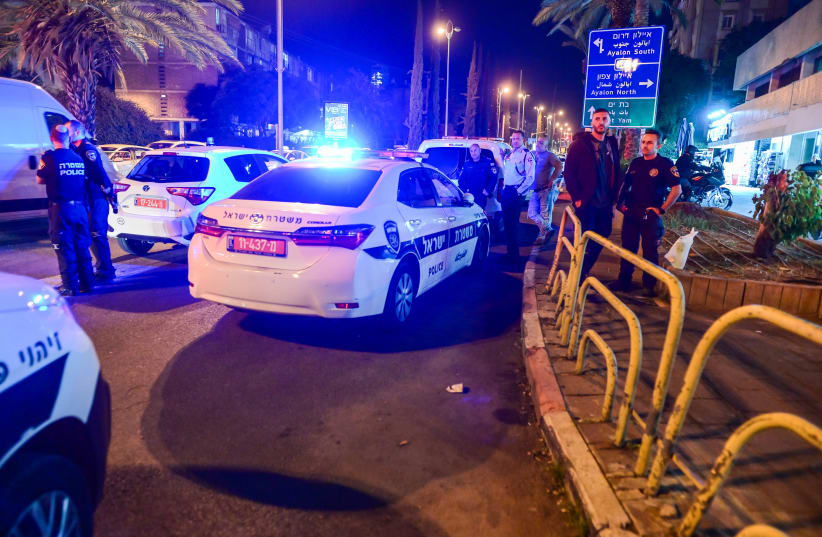Who hasn’t experienced road rage? It may come in the mildest form – a curse under the breath uttered at the car that just cut you off, tailgating, or a more serious hostile action. According to research studies, we’re all at risk of being an abuser or a victim.
In Israel during the past year, police report, road rage incidents have increased at an alarmingly high rate to almost 1,400 cases, compared to just over 1,100 in 2020. If we look farther back in history, Israel has seen a 50% increase in those incidents from five years ago.
I recall treating H, a 70-year-old man who was driving slowly down a local street. The driver in the car behind him kept flashing his bright lights and beeping his horn. When H stopped at a stop sign, the impatient driver behind him got out of his car and started screaming at H and took his fist and banged it against H’s car. When H protested, the perpetrator’s anger escalated, and he put his hands through the car window and began to shake H and curse at him. Then the perpetrator jumped back into his vehicle and took off.
Throughout the next few weeks, H, a victim of road rage, could not sleep and was not able to get back on the road and drive again. It was clear that H was suffering from a trauma with all of the symptoms of post-traumatic stress syndrome.
Since the 1990s, when social scientists began studying the road rage phenomenon, they have been hard-pressed to come up with a reliable theory that explains why some people drive like maniacs and others do not.


One school of thought, presented by mental health professionals, explains road rage as a subtype of a psychological disorder, labeled intermittent explosive disorder (IED).
The Diagnostic and Statistical Manual of Mental Disorders, Fifth Edition (DSM-5), published by the American Psychiatric Association, categorizes IED as a failure to control aggressive impulses, as manifested by the following pattern: unpremeditated temper tantrums, including verbal aggression, sometimes damage or destruction of property and/or physical assault involving physical injury to animals or people.
It has been documented that while anyone can be a perpetrator of road rage, it is most common among younger male drivers. There are certainly many drivers from all age groups that are angry and take their anger out on the road while behind the wheel.
Sociologists add that life in Israel is already stressful enough, with existential military threats and acts of terrorism, something Israelis are all too aware of but need to contain and keep under psychological wraps.
To add to this, following COVID-19 and its resultant economic and family pressures, Israelis have been left with more tension and anger and less patience. When stress factors play a part behind the steering wheel, it is a recipe for disaster.
Of course, many Israelis drive carefully, but the pressures of life can bring out the worst driving behavior in many. And, of course, there have always been those driving maniacs. You can’t miss them. These are the drivers of whom you say to yourself, “He should be arrested.”
Taking responsibility for your own behavior
WHILE RECOGNIZING that we can’t control what the other driver will do, we can take responsibility for our own behavior.
- Leave on time. Habitual lateness is one of the driving factors of unsafe driving. Check traffic reports for construction, traffic crashes, and other delays before leaving. Be sure to give yourself plenty of travel time to reach your destination so you don’t drive aggressively.
- When you get into the car, try to be mindful of your mood. Anger is the big risk factor. If you are already angry for whatever reason, and you get behind the wheel, be aware that you may be vulnerable to exhibiting some road rage behaviors.
So, try to calm yourself down. If you are late for a meeting, tell yourself the world will not come to an end. Make that call or let someone know before you begin driving that you will be late; just don’t add more pressure to your driving experience.
- Relaxation exercises before you start to drive can help. Take a few slow deep inhales and exhales, close your eyes before starting up the car, and try to think of a pleasant thought. Try to hold on to that pleasant thought while driving.
- When someone cuts you off, don’t let your adrenalin response put you at risk of getting into a fight or a car accident. The best mindset when driving is to just expect that there are crazy drivers out there. Don’t personalize, just try to keep your cool.
- Let’s say the guy behind you is giving you the brights because you are driving “too” slowly in the fast lane, even if you are actually doing the speed limit. Put on your blinker and go into the slower lane. Just tell yourself, “The other guy must be in a hurry; it is not directed at me.”
- One of my strongest peeves is how many Israeli drivers tailgate. Don’t tailgate. Even if the person in front of you is driving slowly in the fast lane, tailgating will accomplish nothing. Tailgating is a recipe for a car accident.
- Don’t honk unnecessarily. There are some instances when a light honk might be warranted (e.g., the person in front of you is sitting still at a green light), but honking out of pure frustration is unproductive and irritating to everybody around you. New York City and many other cities around the world have hefty fines for honking without a real cause.
- Listening to some pleasant and relaxing music while driving has been shown to help many drivers relax when behind the wheel.
- Never talk on the phone when you drive. Not only does this cause distractions for the driver, but it can also create tension and stress and may lead to a car accident.
- Don’t allow yourself to get into arguments with other passengers in the car while you drive. This happens too often between parents and their children or between spouses. This is certain to make you more vulnerable to road rage behavior. If you need to argue, pull your car over to the side of the road.
- Have empathy. No one is perfect, and no one is out to get you, so don’t take the others driver’s behavior personally. Put yourself in their shoes. For instance, if somebody is driving slowly, he/she may be lost. There are always two sides to a story, so don’t be too quick to judge.
The good news is that there are many good drivers in Israel, but there are far too many incidents of crazy and dangerous driving and road rage. While you can’t control the behavior of others – that is the job of the police – you can take responsibility for your own driving behavior. Stay safe.
The writer is a marital, child and adult psychotherapist practicing in Jerusalem and Ra’anana and provides online video conferencing psychotherapy. drmikegropper@gmail.com
